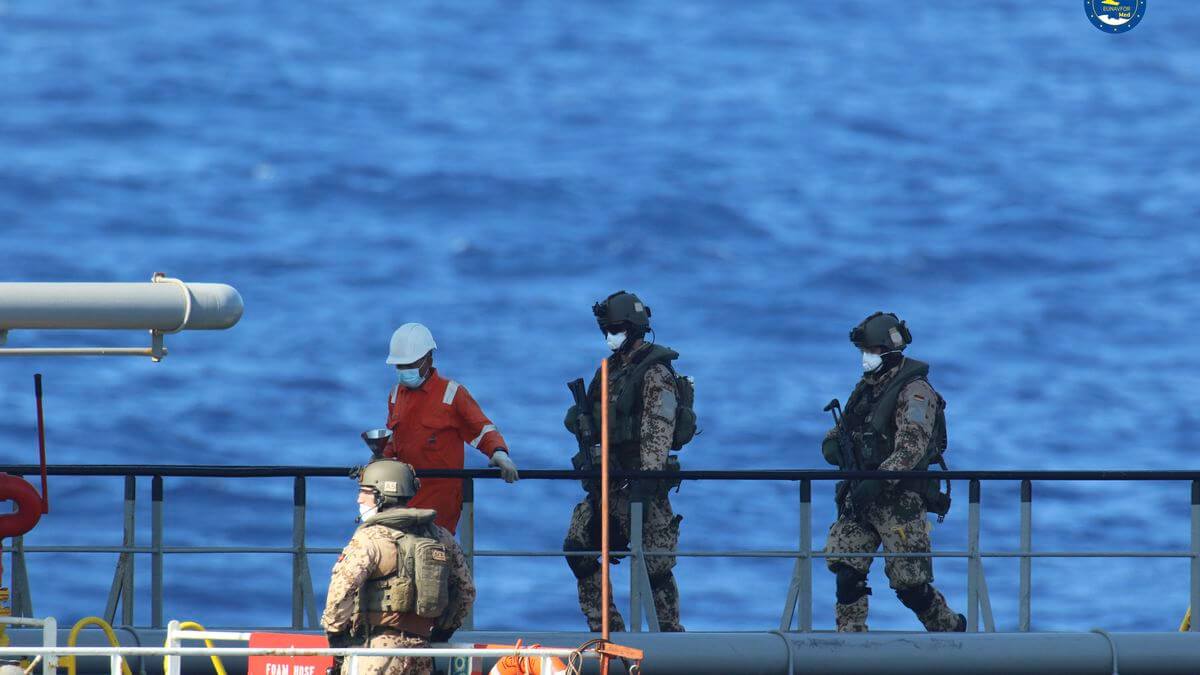On Thursday, a European Union (EU) naval vessel intercepted a cargo ship carrying jet fuel from Sharjah to Benghazi on suspicions that the shipment violated the international arms embargo on Libya.
The EU military mission Project Irini has been stationed in the Mediterranean to halt arms from reaching Libya’s warring governments. According to Reuters, authorities from the mission, in their statement, said that a German frigate, supported by an Italian warship, stopped the United Arab Emirates’ (UAE) MV Royal Diamond 7 moments after dawn, as the tanker pulled up close to Libya’s international waters, around 150 km away from the city of Derna. The statement added that the jet fuel cargo was highly likely to be utilized for military purposes. The ship was then diverted to a port in the EU for further investigation, the location of which is undisclosed. The mission further noted that the UN considers jet fuel a military material, and therefore authorized EU officials to forcibly seize transporting ships carrying these materials and heading towards Libya.
Earlier this week, experts from the United Nations (UN) accused Libya’s warring factions and their foreign supporters of sending mercenaries and armaments to the countries, violating the “totally ineffective” international embargo. Since 2014, Libya has been split in a power struggle between the internationally-recognized Government of National Accord (GNA) based in Tripoli and Benghazi’s Libyan National Army (LNA), led by renegade general Khalifa Haftar. While the GNA is backed militarily and financially by Turkey and Qatar, Haftar’s forces have the support of the UAE, Russia, Egypt, and Jordan.
The UN Security Council has declared an arms embargo on the country to put an end to military confrontation and facilitate a peace process between the warring factions. In that regard, Project Irini has been crucial in enforcing checks for shipments coming into the country.
Leaders from the EU addressed the issue of foreign intervention in Libya for the first time in July, where they discussed the possibility of imposing sanctions against those who violated the arms embargo. The statement read: “We are ready to consider the possible use of sanctions should breaches to the embargo at sea, on land or in the air continue,” adding, “We share serious concerns about the mounting military tensions in this country and the increased risk of regional escalation … We, therefore, call on all the Libyan parties and their foreign supporters to immediately cease the fighting and put an end to the ongoing military escalation across the country.”
Ankara has strongly protested Project Irini, specifically slamming Germany’s role in the mission. In August, Turkish Foreign Minister Mevlut Cavusoglu described Irini as a “biased operation”, and urged Berlin to be “neutral and objective” towards the Libyan situation.
EU Maritime Forces Block UAE Tanker Carrying Jet Fuel To Libya
Officials from the Project Irini mission intercepted and diverted the vessel for further checks
September 11, 2020

A boarding team inspects the Merchant Vessel Royal Diamond 7 on 10 September. SOURCE: EUNAVFOR MED IRINI/ITALIAN DEFENSE MINISTRY VIA AP
